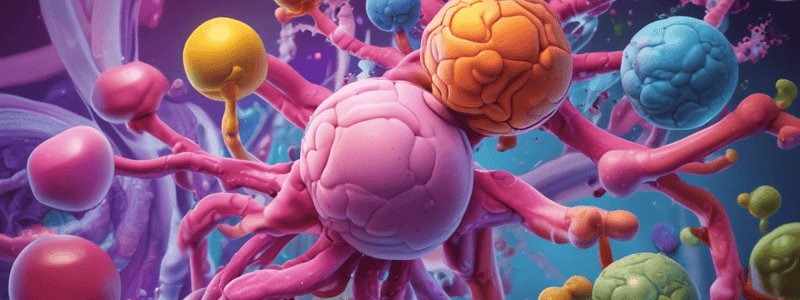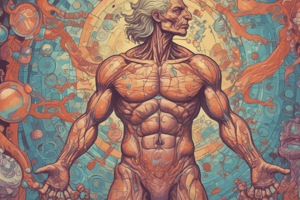Podcast
Questions and Answers
Where are the receptors for steroid hormones located?
Where are the receptors for steroid hormones located?
- In the cytoplasm
- Inside the cell (correct)
- On the cell surface
- In the nucleus
Which hormone is produced by the hypothalamus?
Which hormone is produced by the hypothalamus?
- Dopamine (correct)
- Epinephrine
- Growth hormone
- Insulin
How are nonsteroid hormones transported in the blood?
How are nonsteroid hormones transported in the blood?
- Stored in vesicles
- Bound with carrier proteins
- Attached to cholesterol molecules
- Dissolved in blood stream (correct)
Where are the receptors for nonsteroid hormones located?
Where are the receptors for nonsteroid hormones located?
Which gland secretes triiodothyronine (T3) and thyroxine (T4)?
Which gland secretes triiodothyronine (T3) and thyroxine (T4)?
Which type of hormone is secreted by the anterior pituitary gland and stimulates the production of other hormones in target endocrine glands?
Which type of hormone is secreted by the anterior pituitary gland and stimulates the production of other hormones in target endocrine glands?
Which type of hormone is synthesized from cholesterol and acts by binding to intracellular receptors, thereby regulating gene expression?
Which type of hormone is synthesized from cholesterol and acts by binding to intracellular receptors, thereby regulating gene expression?
Which type of hormone is water-soluble, cannot cross the cell membrane, and binds to receptors on the cell surface, initiating a signal transduction cascade?
Which type of hormone is water-soluble, cannot cross the cell membrane, and binds to receptors on the cell surface, initiating a signal transduction cascade?
Which type of hormone is derived from amino acids and acts as a neurotransmitter in the brain, as well as a hormone in the endocrine system?
Which type of hormone is derived from amino acids and acts as a neurotransmitter in the brain, as well as a hormone in the endocrine system?
Which type of hormone is involved in the regulation of metabolism, growth, and development, and is secreted by the posterior pituitary gland?
Which type of hormone is involved in the regulation of metabolism, growth, and development, and is secreted by the posterior pituitary gland?
Which type of hormone is cortisol?
Which type of hormone is cortisol?
What is the primary function of adrenaline (epinephrine) and noradrenaline (norepinephrine) in the body?
What is the primary function of adrenaline (epinephrine) and noradrenaline (norepinephrine) in the body?
Which of the following hormones is NOT produced by the adrenal cortex?
Which of the following hormones is NOT produced by the adrenal cortex?
When blood calcium levels drop, which hormone is released to increase calcium levels?
When blood calcium levels drop, which hormone is released to increase calcium levels?
Which hormone is responsible for regulating normal calcium homeostasis?
Which hormone is responsible for regulating normal calcium homeostasis?
Which hormone is responsible for increasing the release of cortisol from the adrenal cortex during stress?
Which hormone is responsible for increasing the release of cortisol from the adrenal cortex during stress?
Which of the following hormones is NOT released during stress?
Which of the following hormones is NOT released during stress?
Which hormone plays a crucial role in maintaining plasma glucose concentration?
Which hormone plays a crucial role in maintaining plasma glucose concentration?
What is the main function of thymosin secreted by the thymus gland?
What is the main function of thymosin secreted by the thymus gland?
Which hormone stimulates growth, cell reproduction, and regeneration?
Which hormone stimulates growth, cell reproduction, and regeneration?
Which organ serves as an endocrine gland producing insulin and glucagon among other important hormones?
Which organ serves as an endocrine gland producing insulin and glucagon among other important hormones?
Which hormone is responsible for the production and release of melanin by melanocytes in skin and hair?
Which hormone is responsible for the production and release of melanin by melanocytes in skin and hair?
Where is Melanocyte-stimulating hormone (MSH) produced?
Where is Melanocyte-stimulating hormone (MSH) produced?
Which gland produces melatonin that affects wake/sleep patterns?
Which gland produces melatonin that affects wake/sleep patterns?
Which type of hormones are produced by the glands present in the sex organ?
Which type of hormones are produced by the glands present in the sex organ?
Which type of hormones usually bind to cell surface receptors?
Which type of hormones usually bind to cell surface receptors?
Which type of hormones are synthesized from cholesterol?
Which type of hormones are synthesized from cholesterol?
What is the primary mode of action for nonsteroid hormones?
What is the primary mode of action for nonsteroid hormones?
Which type of hormones diffuse easily through cell membranes?
Which type of hormones diffuse easily through cell membranes?
Which group of hormones includes adrenaline and dopamine?
Which group of hormones includes adrenaline and dopamine?
Which of the following best describes the role of signal transduction in hormonal signaling?
Which of the following best describes the role of signal transduction in hormonal signaling?
Which of the following statements best describes the role of second messengers in hormonal signaling?
Which of the following statements best describes the role of second messengers in hormonal signaling?
Which of the following best describes the mechanism of action of steroid hormones?
Which of the following best describes the mechanism of action of steroid hormones?
Which of the following is a characteristic of peptide and protein hormones?
Which of the following is a characteristic of peptide and protein hormones?
Which of the following best describes the role of negative feedback in hormonal regulation?
Which of the following best describes the role of negative feedback in hormonal regulation?
Which of the following is a characteristic of amine hormones, such as epinephrine and norepinephrine?
Which of the following is a characteristic of amine hormones, such as epinephrine and norepinephrine?
Which of the following statements best describes the role of receptor proteins in hormonal signaling?
Which of the following statements best describes the role of receptor proteins in hormonal signaling?
Which of the following statements best describes the role of carrier proteins in hormonal signaling?
Which of the following statements best describes the role of carrier proteins in hormonal signaling?
Which of the following statements best describes the mechanism of action of nonsteroid hormones, such as peptide and protein hormones?
Which of the following statements best describes the mechanism of action of nonsteroid hormones, such as peptide and protein hormones?
Which of the following statements best describes the role of degradation in hormonal signaling?
Which of the following statements best describes the role of degradation in hormonal signaling?
Flashcards are hidden until you start studying
Study Notes
Hormones and Their Functions
- Follicle-stimulating hormone (FSH) stimulates the production of sex hormones in the glands present in the sex organ.
- Growth hormone (GH) stimulates growth, cell reproduction, and regeneration.
- Melanocyte-stimulating hormones (MSH or intermedins) stimulate the production and release of melanin by melanocytes in skin and hair, increasing pigmentation in pregnant women.
The Hypothalamus and Pituitary Gland
- The hypothalamus is the "interpreter" between the brain and the pituitary gland, detecting the needs of various parts of the body by chemically monitoring the blood.
- The pituitary gland is the "brain" of the endocrine system, functionally connected to the hypothalamus, and secretes many hormones called "trophic hormones" that cause other glands to make other hormones.
Types of Hormones
- Steroid hormones are lipid-loving (hydrophobic) and require binding with carrier proteins to form lipoproteins for transportation in the blood, e.g., estrogen, progesterone, and testosterone.
- Nonsteroid hormones are water-loving (hydrophilic) and can be dissolved in the bloodstream and easily transported, e.g., triiodothyronine (T3), thyroxine (T4), epinephrine, norepinephrine, dopamine, insulin, and growth hormone.
How Hormones Work
- Hormones bind to specific receptor proteins on the surface of or inside target cells, triggering a response.
- Hormonal signaling involves biosynthesis, storage, and secretion of hormones, transport to target cells, and recognition by receptor proteins.
- The signal can be amplified through a signal transduction process.
The Endocrine Glands
- The hypothalamus is the link between the nervous system and the endocrine system.
- The pituitary gland is the "master gland" that regulates other endocrine glands.
- The thyroid gland regulates both cellular and body metabolism and produces hormones that stimulate growth and development.
- The parathyroid gland controls the amount of calcium in the blood and within the bones.
- The adrenal glands produce corticosteroid hormones, adrenaline, and noradrenaline.
- The pancreas is an endocrine gland that produces insulin and glucagon.
- The thymus gland promotes the production and maturation of white blood cells.
Endocrine Disorders
- Hyposecretion is the secretion of too little hormone, while hypersecretion is the secretion of too much hormone.
- Hyporesponsiveness and hyperresponsiveness occur when target cells do not respond properly to a hormone.
- Examples of endocrine disorders include hyperthyroidism, hypothyroidism, Cushing's syndrome, and Addison's disease.
Control of Hormone Function
- The endocrine system responds to stresses on the body by increasing the release of cortisol and epinephrine.
- Cortisol permits the action of epinephrine and norepinephrine on muscles and blood vessels, maintains cellular concentrations of metabolic enzymes, and decreases events associated with the inflammatory response.
- The endocrine system maintains homeostasis through negative feedback loops.
Studying That Suits You
Use AI to generate personalized quizzes and flashcards to suit your learning preferences.




